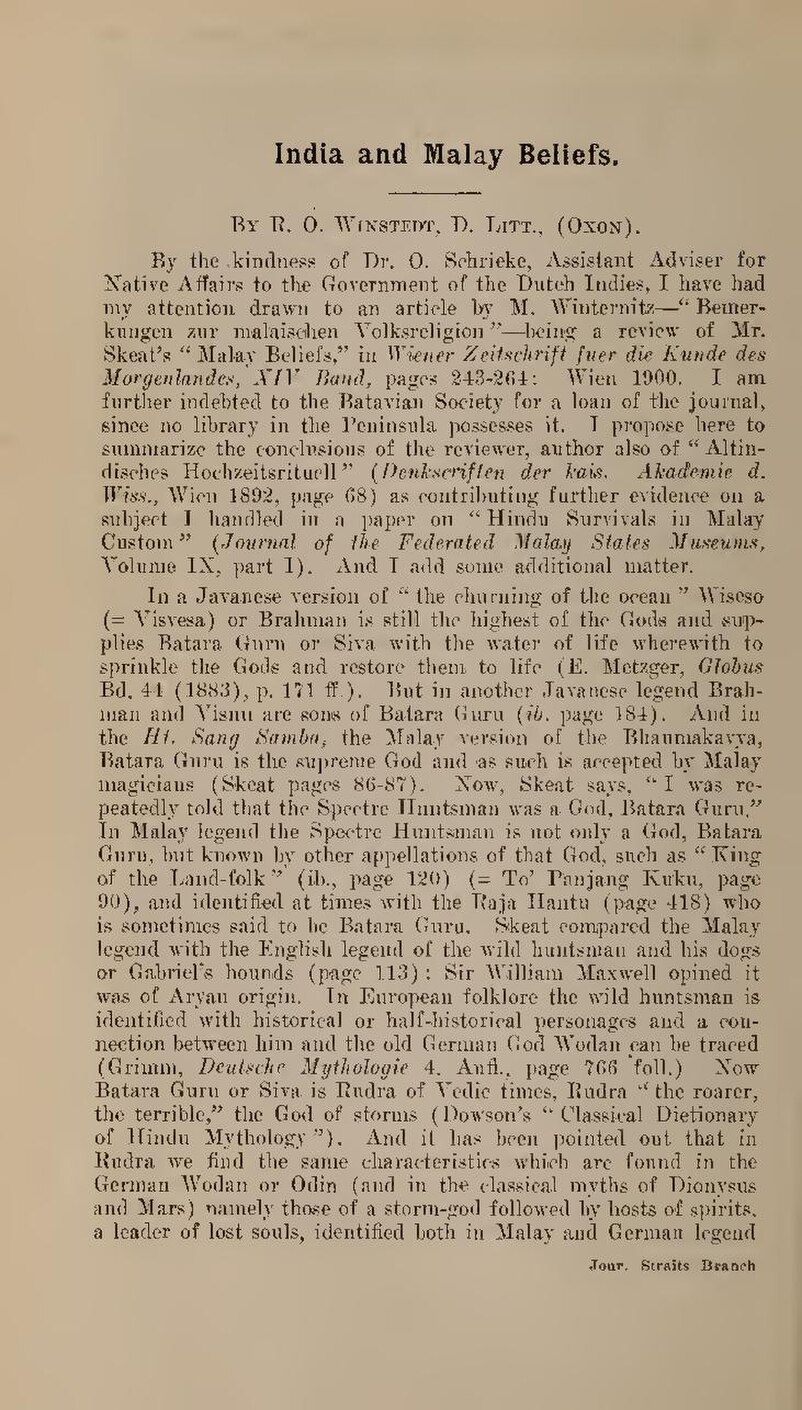India and Malay Beliefs.
By R. O. Winstedt, D. Litt., (Oxon).
By the kindness of Dr. O. Schrieke, Assistant Adviser for Native Affairs to the Government of the Dutch Indies, I have had my attention drawn to an article by M. Winternitz—"Bemerkungen zur malaischen Volksreligion"—being a review of Mr. Skeat's "Malay Beliefs," in Wiener Zeitschrift fuer die Kunde des Morgenlandes, XIV Band, pages 243-264: Wien 1900. I am further indebted to the Batavian Society for a loan of the journal, since no library in the l'eninsula possesses it. I propose here to summarize the conclusions of the reviewer, author also of "Altindisches Hochzeitsrituell" (Denkscriften der kais. Akademie d. Wiss., Wien 1892, page 68) as contributing further evidence on a subject I handled in a paper on "Hindu Survivals in Malay Custom" (Journal of the Federated Malay States Museums, Volume IX, part 1). And I add some additional matter.
In a Javanese version of "the churning of the ocean" Wiseso (= Visvesa) or Brahman is still the highest of the Gods and supplies Batara Gurn or Siva with the water of life wherewith to sprinkle the Gods and restore them to life (E. Metzger, Globus Bd. 41 (1883), p. 171 ff.). But in another Javanese legend Brahman and Visnu are sons of Batara Guru (ib. page 184). And in the Ht. Sang Samba, the Malay version of the Bhaumakavya, Batara Guru is the supreme God and as such is accepted by Malay magicians (Skeat pages 86-87). Now, Skeat says, "I was repeatedly told that the Spectre Huntsman was a God, Batara Guru," In Malay legend the Spectre Huntsman is not only a God, Batara Guru, but known by other appellations of that God, such as "King of the Land-folk" (ib., page 120) (= To' Panjang Kuku, page 90), and identified at times with the Raja Hantu (page 418) who is sometimes said to be Batara Guru. Skeat compared the Malay legend with the English legend of the wild huntsman and his dogs or Gabriel's hounds (page 113): Sir William Maxwell opined it was of Aryan origin. In European folklore the wild huntsman is identified with historical or half-historical personages and a connection between him and the old German God Wodan can be traced (Grimm, Deutsche Mythologie 4. Aufl., page 766 foll.) Now Batara Guru or Siva is Rudra of Vedic times, Rudra "the roarer, the terrible," the God of storms (Dowson's "Classical Dictionary of Hindu Mythology"). And it has been pointed out that in Rudra we find the same characteristics which are found in the German Wodan or Odin (and in the classical myths of Dionysus and Mars) namely those of a storm-god followed by hosts of spirits. a leader of lost souls, identified both in Malay and German legend
